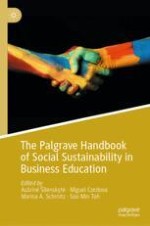2024 | OriginalPaper | Buchkapitel
25. Using the Theory of Planned Behavior to Develop Business Students into Capable Change Agents for Socially Sustainable Development
verfasst von : Ananya Bhattacharya, Wee Chan Au, Glen Croy
Erschienen in: The Palgrave Handbook of Social Sustainability in Business Education
Verlag: Springer Nature Switzerland
Aktivieren Sie unsere intelligente Suche, um passende Fachinhalte oder Patente zu finden.
Wählen Sie Textabschnitte aus um mit Künstlicher Intelligenz passenden Patente zu finden. powered by
Markieren Sie Textabschnitte, um KI-gestützt weitere passende Inhalte zu finden. powered by
